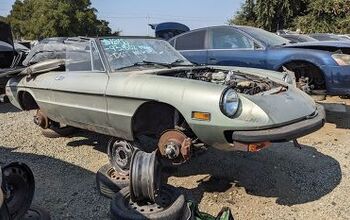Will Natural Gas Prevent Us From Reaching A Better Place?
A brief piece in the Wall Street Journal’s “Dealbook” discussed the potential of natural gas powered vehicles, largely as a way to stop falling prices for natural gas.
One hope for many natural gas producers reeling from collapsing prices is wider adoption of natural-gas-powered cars.
The biggest hurdle so far: lack of infrastructure to refuel them.
But Steven Mueller, CEO of Southwestern Energy, says if 10% of passenger cars were powered by natural gas, gasoline prices would fall by $1.60/gallon and gas producers would get 4 billion cubic feet/day in demand.
The global supply of natural gas is way up, thanks to shale deposits in the United States and other locales. Currently, the Honda Civic GX is the best-known CNG vehicle on sale currently. Buses, taxis and other commercial vehicles have been running on CNG for years, but Dodge is set to introduce a Ram Tradesman that can run on CNG – other work trucks have been converted to run on natural gas by their owners (at significant expense), but this looks to be one of the first OEM-engineered work trucks with this capability.
An NPR report (sponsored by a natural gas lobby group) touched on President Obama’s visit to a big rig factory, some of which were powered by natural gas. Obama proposed – you guessed it – tax incentives for alternative fuel vehicles, including natural gas. Natural gas vehicles aren’t that popular around the world, but have a certain following – Brazilian Fiat Siena taxicabs, LPG powered Volvos and the famous Panther platform Crown Vics and Town Cars that serve as taxi and livery cars in Toronto all exist, albeit in very small numbers.
Natural gas could potentially be a “black swan event” for the auto industry, a cheap, clean-burning fuel that could allow for both domestic energy independence and the continued hegemony of the internal combustion engine. Drivers wouldn’t have to worry about foreign oil, range anxiety or battery bricking.
The obvious problem is the lack of infrastructure. Natural gas filling stations are scant, to put it mildly. But there are rumblings (so far unsubstantiated – but keep watching TTAC for more info) that building filling stations, be it for hydrogen or other fuels, is easier and cheaper than trying to develop serious long-range, quick charging, sustainable and affordable battery technology. If this turns out to be true, then it suggests that electric cars will be forever relegated to “second car/commuter car” status.
A final note: Israel, home of Better Place and their battery swapping stations, is said to have enormous shale oil and gas deposits (so much for the joke about the Israelites wandering for 40 years and finding no oil). Aside from the obvious geopolitical implications, what kind of future would that leave for the Better Place program?
More by Derek Kreindler
Latest Car Reviews
Read moreLatest Product Reviews
Read moreRecent Comments
- SCE to AUX All that lift makes for an easy rollover of your $70k truck.
- SCE to AUX My son cross-shopped the RAV4 and Model Y, then bought the Y. To their surprise, they hated the RAV4.
- SCE to AUX I'm already driving the cheap EV (19 Ioniq EV).$30k MSRP in late 2018, $23k after subsidy at lease (no tax hassle)$549/year insurance$40 in electricity to drive 1000 miles/month66k miles, no range lossAffordable 16" tiresVirtually no maintenance expensesHyundai (for example) has dramatically cut prices on their EVs, so you can get a 361-mile Ioniq 6 in the high 30s right now.But ask me if I'd go to the Subaru brand if one was affordable, and the answer is no.
- David Murilee Martin, These Toyota Vans were absolute garbage. As the labor even basic service cost 400% as much as servicing a VW Vanagon or American minivan. A skilled Toyota tech would take about 2.5 hours just to change the air cleaner. Also they also broke often, as they overheated and warped the engine and boiled the automatic transmission...
- Marcr My wife and I mostly work from home (or use public transit), the kid is grown, and we no longer do road trips of more than 150 miles or so. Our one car mostly gets used for local errands and the occasional airport pickup. The first non-Tesla, non-Mini, non-Fiat, non-Kia/Hyundai, non-GM (I do have my biases) small fun-to-drive hatchback EV with 200+ mile range, instrument display behind the wheel where it belongs and actual knobs for oft-used functions for under $35K will get our money. What we really want is a proper 21st century equivalent of the original Honda Civic. The Volvo EX30 is close and may end up being the compromise choice.


































Comments
Join the conversation
Toronto experience: those CNG cabs and livery cars are useless if you have luggage--the tanks take up most of the trunk. Oh, and also: CNG blows up real good. Like this: http://www.youtube.com/watch?v=9ZmRvEEM3DQ&feature=related My windows vibrated. From 6 km away. You want to park a CNG car in your attached garage? I'd sooner park the Hindenburg in mine. Home compression filling stations? What a wonderful idea. Right next to the hot-and-cold running nitroglycerin.
Saw this morning an article about Japan abandoning nuclear power in favor of using Canadian natural gas to produce electricity. If we all jump on the natural gas bandwagon what are prices going to do? Same as the oil prices. Climb. Another headline - China and India possibly beginning a defensive arms race. Again what do we expect fossil fuels to do as a country with $1.5B and another country with $1.3B people try to enter first world status with all the same consumption patterns as we have enjoyed for 60 years? Diversification is the best route. So is getting as many updates done now while the price of fuel and technology is affordable. If the dollar drops as we slide to second fiddle status in the global economy, if the cost of fuel and raw materials increases sharply - those upgrades and efforts at diversification will be vastly more expensive. A transition to a diversified list of energy sources is the only way and cheaper that the wars our gov't keeps investing in. I'm surprised we Americans can't see the the value in keeping all your eggs out of one basket by now. We've seen what happens in the real estate markets, investment markets, gold markets, car business, etc. etc. I do recognize that the eggs in one basket makes somebody alot of money each time we have another economic bubble though. And still more money as those left with enough money start to buy up all the failed pieces of that bubble. Seems to me that there is a motivation for some to encourage bubbles and then get out just in time and then come back to buy up the pieces and reap more profits.